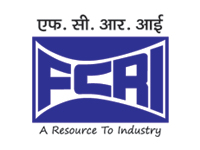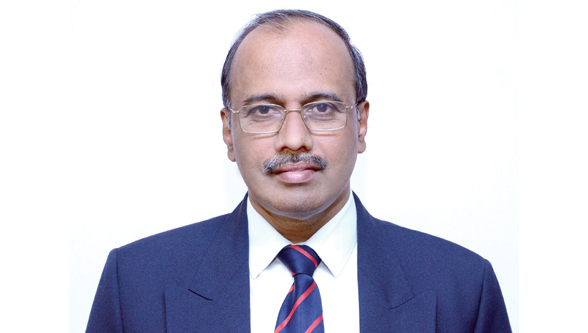Reliable service provider in fluid flow technology
Our vision is to be a globally renowned and reliable service provider in fluid flow technology: Dr. Jacob Chandapillai
Q. What’s FCRI’ role in Flow Measurement and Calibration?
The accuracy of fluid flow plays a very vital role in the industry and in fact it is the single largest measurement parameter which is decisive in the quality and quantity of products. Hence having a measurement standard of International acceptance is of high priority. The very purpose of establishing FCRI by Govt. of India was to create a facility that would provide a standard for flow measurement in air, water and oil flow medium. Government has invested more than Rs. 75 crores to establish the flow standards of FCRI and has developed it to a world-class fluid flow laboratory.
Practically FCRI has been maintaining the fluid flow standard in Water, Air and Oil medium for the country since last 25 years and is holding accreditation from National Accreditation Board for testing and calibration Laboratories (NABL) or equivalent throughout this period. FCRI is also regularly participating in inter-laboratory comparisons with National Metrology Institutes of other countries like NEL United kingdom and NMI Netherlands and has proved its International credentials. In a nutshell, FCRI provides services equivalent to International standards to Indian Industry and, to some extent, to overseas clients.
Q. What are the different flow media you handle today?
We at FCRI handle Water, Oil with different viscosities, Air at atmospheric pressure, Air at 20 bar, and Natural Gas.
Q. Could you give a ringside view of the facilities you have recently added?
• Testing facility for Special nozzles used in Launch vehicles for LPSC:
The high flow high pressure test requirement for LPSC injection valve which controls Injection Thrust Vector Control System by injecting an aqueous solution of strontium perchlorate into the nozzle to produce asymmetric thrust in PSLV. A facility was made to test these valves.
• Endurance testing of safety relief valve at elevated temperature: Product validation of safety relief valve screening, analysis and optimization activities have entered a new phase where the emphasis is shifting from doing just what is necessary to doing what is necessary and sufficient to build a knowledge base for future evaluations to identify performance trends. A Special Valve Flow Test Facility was suitably created to perform this reliability test.
• Simulation of severe accident test facility (LOCA and MSLB): Severe Accident (SA, EDBE) refers to an event causing significant damage to reactor fuel and resulting from more or less complete core meltdown. Such accidents are highly unlikely in the light of the preventive measures implemented by operators. In this facility, along with steam temperature and water flow, air pressure in the chamber is also required to be controlled for achieving the required profile simulation. The facility is provided with steam and electrical heating supplemented by steam jacket heating. The chamber has provision for admitting dry air and steam. The electrical heater and steam jacket will provide the required degree of super heating needed for the Loss of Coolant Accident (LOCA) and Main Steam Leakage Breakdown (MSLB) tests. Water spray provision is also made for sudden cooling of the chamber to meet the LOCA / MSLB test requirements.
Apart from the above test facilities,FCRI has facilities for:
• Fugitive Emission testing
• Cryogenic testing
• Life cycle tests
• Fire / Pressure Testing
• CV testing of valves, and
• Hot and cold endurance testing of Special valves
Q. What’s your contribution to quality assurance in the core sector?
The right infrastructure and well experienced manpower available, give FCRI the supremacy in the field for fluid flow parameters in air, oil and water medium. FCRI’s vision is ‘To be a globally renowned and reliable service provider in fluid flow technology’.
Core activities of FCRI include:
• Quality evaluation of Flow products as per International standards
• Execution of projects sponsored by Private, Public and Government Agencies.
• Standardization and “Model Approval” Evaluation of flow elements as per OIML R-117 (Legal Metrology) Standards on behalf of legal metrology
• Site testing and auditing of flow metering skids and large pipe-line flow
• Consultancy activities in Water, Oil & Gas Sector
We must also mention that the design, development and execution of all the facilities in FCRI were done by FCRI engineers (with the guidance of UNDP experts in the beginning). Later FCRI has independently developed
• One of the largest water flow laboratories in the world
• Oil flow laboratory with multi-viscous oils
• Centre for water management
• High pressure Air flow facility
• Multiphase flow laboratory
• CNG test facilities
• A variety of test facilities for special tests
• FCRI is also in the business of design and supply of customized flow facilities for the customers
What makes FCRI unique is:
• Its best uncertainties in flow measurement in our country whether it is oil /air / water medium. Flow laboratories are with uncertainties comparable and in some cases better than International facilities. The uncertainties begin from 0.02%.
• More than 30 years of experience in the flow measurement and control arena
• Well experienced and expert manpower
• FCRI has played a pivotal role for the quality improvement of flow measurement and control in India
• For all practical purposes, FCRI’s world renowned facilities serve our nation as a National standard for flow measurement
• Constant up-gradation of facilities to keep FCRI at par with other world-class facilities and by proving its International reliability through Inter-comparisons with other similar facilities. Continuous International inter-comparisons with National Engineering Laboratory -UK, CMI-Czech Republic , NIST-USA, Delft Hydraulics Netherlands, etc. and publication of the results in global conferences have helped FCRI to gain International credibility.
• The user industry has developed confidence in their flow measurement by constant monitoring of their flow parameters through FCRI’s standard facilities and expertise.
• FCRI is doing Site auditing of gas and oil metering skids. Considering the fact that Government of India is focusing towards the installation of gas and oil pipelines across the country covering all states, FCRI’s role as a third-party auditor is expected to gain prominence.
• It is also working with reputed educational institutions in the country for improving research outputs. Recently, FCRI has joined hands with IIT Mumbai and IIT Guwahati and is doing a project funded by European Union and DST for the enhancement of water distribution in our country.
• It has recently developed a unique Valve Cavitation Research Centre for the use of process industry where you can test valves for its performance and effectiveness under cavitating conditions.
• In situ flow measurement is very difficult to do in large pipe lines at site. FCRI is focusing on this area using various methods like tracer dilution method with non-radioactive dye- injection, clamp on ultrasonic flow meter, Insertion type flow meters, etc.
• FCRI has close working relations with Czech Metrology Institute (CMI)
• FCRI has been conducting International courses. More than 1000 participants from 90 different countries have attended FCRI’s courses so far. Maintaining and constantly improving flow measurement standards to the best uncertainty is a colossal task, considering the complexity involved in the flow measurement standards. FCRI has been doing this task commendably well.
International Training Program for foreign nationals through Government of India‘s various Sponsored programs. More than 1000 participants from 90 different countries have participated in these programs so far.
International courses include topics such as:
• Oil & Gas Flow Measurement & Control
• Flow Measurement & Control Techniques/software in Industrial process & Water Distribution System
• Instrumentation & Control & Data Acquisition System were organized.
• National bi-monthly courses
• Customised Courses covering topics on
• Dispensers for Diesel/Petrol/CNG/LPG
• Concepts of LNG and Natural gas metering & custody transfer
• Flow Metering in Gas Business
• ISO/IEC 17025 and NABL Accreditation
• Oil and gas Flow measurements and CTMS
• Water Transmission & Distribution Engineering
• Flow Metering in Gas Business (for GAIL Engineers)
Q. Could you quantify the foreign exchange you may have saved for the country through indigenous flow testing, calibration & training of foreign students?
About 50 to 60 lakhs Rupees per annum and growing steadily.
Share feedback and join the discussion on the Telegram Group
https://t.me/joinchat/





